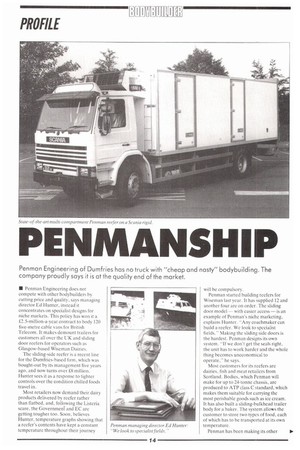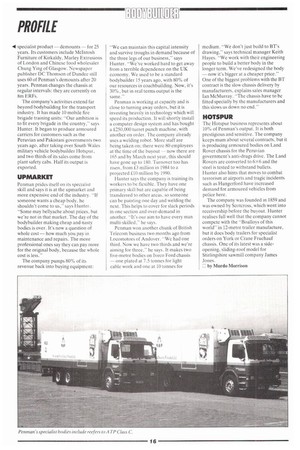NMANSHIP
Page 126

Page 128

If you've noticed an error in this article please click here to report it so we can fix it.
Penman Engineering of Dumfries has no truck with "cheap and nasty" bodybuilding. The company proudly says it is at the quality end of the market.
• Penman Engineering does not compete with other bodybuilders by cutting price and quality, says managing director Ed Hunter, instead it concentrates on specialist designs for niche markets. This policy has won it a £2.5-million-a-year contract to body 120 five-metre cable vans for British Telecom. It makes demount trailers for customers all over the UK and sliding door reefers for operators such as Glasgow-based Wiseman Dairies.
The sliding-side reefer is a recent line for the Dumfries-based firm, which was bought-out by its management five years ago, and now turns over £8 million. Hunter sees it as a response to tighter controls over the condition chilled foods travel in.
Most retailers now demand their dairy products delivered by reefer rather than flatbed, and, following the Listeria scare, the Government and EC are getting tougher too. Soon, believes Hunter, temperature graphs showing that a reefer's contents have kept a constant temperature throughout their journey will be compulsory.
Penman started building reefers for Wiseman last year. It has supplied 12 and another four are on order. The sliding door model — with easier access— is an example of Penman's niche marketing, explains Hunter. "Any coachmaker can build a reefer. We look to specialist fields." Making the sliding side doors is the hardest. Penman designs its own system. ''If we don't get the seals right, the unit has to work harder and the whole thing becomes uneconomical to operate," he says.
Most customers for its reefers are dairies, fish and meat retailers from Scotland. Bodies, which Penman will make for up to 24-tonne chassis, are produced to ATP class C standard, which makes them suitable for carrying the most perishable goods such as ice cream. It has also built a sliding-bulkhead trailer body for a baker. The system allows the customer to store two types of food, each of which has to be transported at its own temperature.
Penman has been making its other
• specialist product — demounts— for 25 years. Its customers include McIntosh Furniture of Kirkaldy, Marley Extrusions of London and Chinese food wholesaler Chung Ying of Glasgow. Newspaper publisher DC Thomson of Dundee still uses 60 of Penman's demounts after 20 years. Penman changes the chassis at regular intervals: they are currently on 8m ERFs.
The company's activities extend far beyond bodybuilding for the transport industry. It has made 10 mobile fire brigade training units: "Our ambition is to fit every brigade in the country," says Hunter. It began to produce armoured carriers for customers such as the Peruvian and Pakistani governments two years ago, after taking over South Wales military vehicle bodybuilder Hotspur, and two thirds of its sales come from plant safety cabs. Half its output is exported.
UPMARKET
Penman prides itself on its specialist skill and says it is at the upmarket and more expensive end of the industry. "If someone wants a cheap body, he shouldn't come to us," says Hunter. "Some may bellyache about prices, but we're not in that market. The day of the bodybuilder making cheap and nasty bodies is over. It's now a question of whole cost how much you pay in maintenance and repairs. The more professional ones say they can pay more for the original body, because the whole cost is less."
The company pumps 80% of its revenue back into buying equipment: "We can maintain this capital intensity and survive troughs in demand because of the three legs of our business," says Hunter. "We've worked hard to get away from a terrible dependence on the UK economy. We used to be a standard bodybuilder 15 years ago, with 80% of our resources in coachbuilding. Now, it's 30%, but in real terms output is the same."
Penman is working at capacity and is close to turning away orders, but it is investing heavily in technology which will speed its production. It will shortly install a computer design system and has bought a £250,000 turret punch machine, with another on order. The company already uses a welding robot. More staff are being taken on; there were 80 employees at the time of the buyout now there are 165 and by March next year, this should have gone up to 180. Turnover too has risen, from £3 million in 1984 to a projected £10 million by 1990.
I hinter says the company is training its workers to be flexible. They have one primary skill but are capable of being transferred to other areas, so someone can be painting one day and welding the next. This helps to cover for slack periods in one section and over-demand in another. "It's our aim to have every man multi-skilled,he says.
Penman won another chunk of British Telecom business two months ago from Locomotors of Andover. -We had one third. Now we have two thirds and we're aiming for three," he says. It makes two five-metre bodies on Iveco Ford chassis -one plated at 7.5 tonnes for light cable work and one at 10 tonnes for medium. "We don't just build to BT's drawing," says technical manager Keith Hayes. -We work with their engineering people to build a better body in the longer term. We've redesigned the body — now it's bigger at a cheaper price.One of the biggest problems with the BT contract is the slow chassis delivery by manufacturers, explains sales manager Ian McMurray. "The chassis have to be fitted specially by the manufacturers and this slows us down no end."
HOTSPUR
The Hotspur business represents about 10% of Penman's output. It is both prestigious and sensitive. The company keeps mum about several contracts, but it is producing armoured bodies on Land Rover chassis for the Peruvian government's anti-drugs drive. The Land Rovers are converted to 6x 6 and the steel is tested to withstand bullets. Hunter also hints that moves to combat terrorism at airports and tragic incidents such as Hungerford have increased demand for armoured vehicles from police here.
The company was founded in 1859 and was owned by Scotcross, which went into receivership before the buyout. Hunter realises full well that the company cannot compete with the "Boalloys of this world" in 12-metre trailer manufacture, but it does body trailers for specialist orders on York or Crane Fruehauf chassis. One of its latest was a sideopening, sliding-roof model for Stirlingshire sawmill company James Jones.
by Murdo Morrison




















































































































































